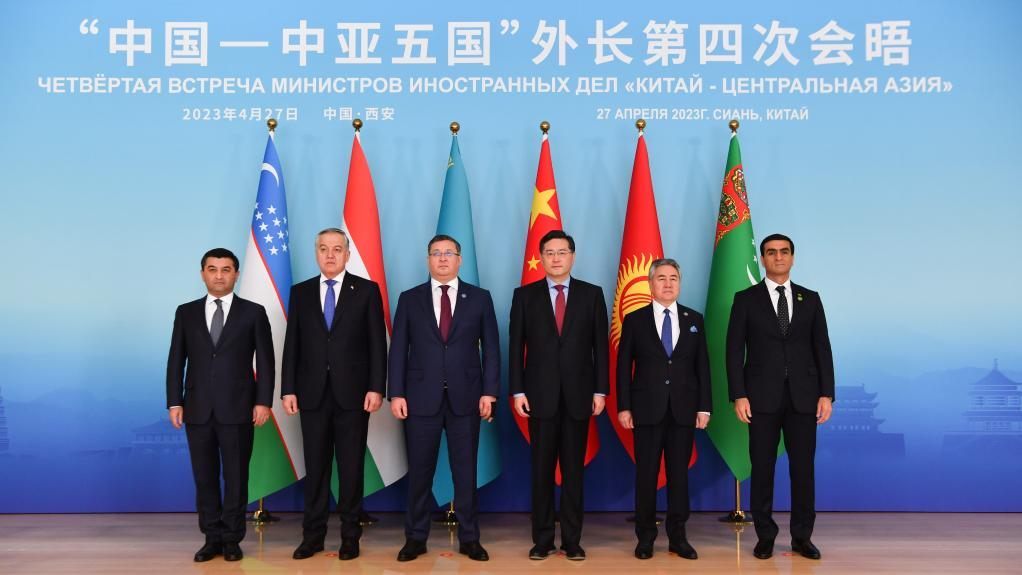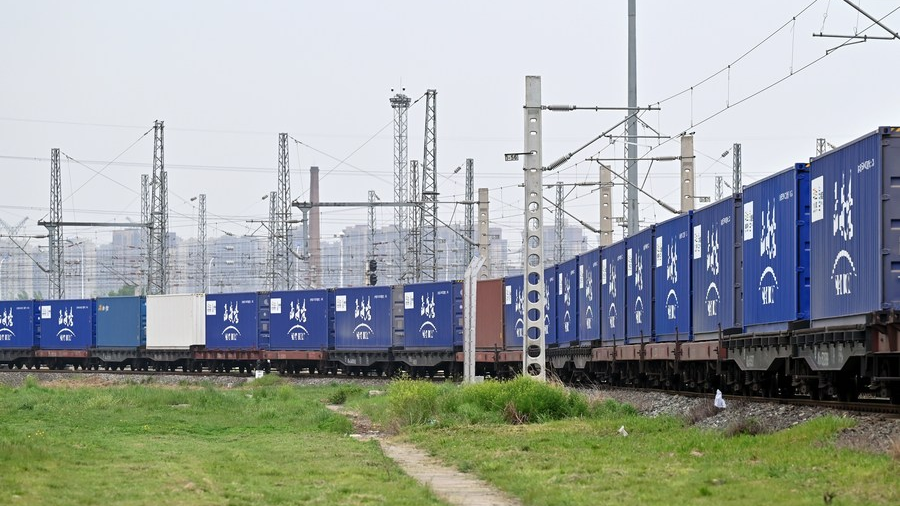
Foreign ministers of China, Kazakhstan, Kyrgyzstan, Tajikistan, Uzbekistan and Turkmenistan attend the fourth China-Central Asia Foreign Ministers' Meeting in Xi'an, northwest China's Shaanxi Province, April 27, 2023. /Xinhua
Foreign ministers of China, Kazakhstan, Kyrgyzstan, Tajikistan, Uzbekistan and Turkmenistan attend the fourth China-Central Asia Foreign Ministers' Meeting in Xi'an, northwest China's Shaanxi Province, April 27, 2023. /Xinhua
Editor's note: Azhar Azam works in a private organization as a market and business analyst and writes about geopolitical issues and regional conflicts. The article reflects the author's opinions and not necessarily those of CGTN.
China greatly values its relationship with the Central Asian countries. Beijing continues to reiterate its resolute support for the region's security and territorial integrity, opposes any foreign interference in the internal affairs of the regional states and stays keen to build mutual trust and expand cooperation in areas including trade and investment, infrastructure development, agriculture, healthcare and energy and minerals.
Underlying these key principles of independence, the Chinese Foreign Minister and State Councilor Qin Gang hosted top diplomats of Kazakhstan, Kyrgyzstan, Tajikistan, Turkmenistan and Uzbekistan in the fourth China-Central Asia Foreign Ministers' Meeting in Xi'an, northwest China's Shaanxi Province on April 27 to promote hexagonal cooperation and exchange views on international issues and prospects and contours of further engagement.
As all countries reciprocated their partner's trust by backing the Chinese vision of peaceful development, the relationship is set to solidify with the first-ever China-Central Asia Summit, comprising state heads of China and Central Asian nations in May.
Amid growing strategic coordination in the face of regional and global challenges, trade between China and Central Asia was estimated to exceed $70 billion in 2022 at a staggering increase of 40 percent compared to 2021. The surge is about 100 times over the past 30 years since the establishment of diplomatic ties and the Central Asian diplomats vow to make the next 30 years an era of golden cooperation.
The China-Central Asia Gas Pipeline is a fabulous model of multilateral energy cooperation. The 1,833-km gas transmission line – which runs from the borders of Turkmenistan and Uzbekistan, and passes through Uzbekistan and Kazakhstan – according to the PipeChina West Pipeline Company, had delivered more than 40 billion cubic meters of natural gas to China by the end of last year, giving Central Asia the access of one of the world's largest energy markets.
Kazakhstan's Deputy Prime Minister and Minister of Foreign Affairs Murat Nurtleu gave the credit for creating the China-Central format to Beijing that aims to improve political and diplomatic interaction and enhance cooperation in trade, investment, transport, healthcare, technology and other areas. This highlights China will be featuring prominently in Central Asia's economic ambitions over the next few decades.

A China-Europe freight train gets ready to leave for Kazakhstan from Xi'an International Port in Xi'an, northwest China's Shaanxi Province, April 13, 2021. /Xinhua
A China-Europe freight train gets ready to leave for Kazakhstan from Xi'an International Port in Xi'an, northwest China's Shaanxi Province, April 13, 2021. /Xinhua
Uzbekistan's Foreign Minister Bakhtiyor Saidov also hailed the format as an important platform to strengthen regional connectivity and deepen multi-layered cooperation. The Tajik Minister of Foreign Affairs Sirodjiddin Mukhriddin too was upbeat about the China-Central Asia relationship and bilateral strategic partnership.
As the Central Asian delegates explore areas of cooperation ahead of the China-Central Asia Summit and have attended the 10th anniversary of the China-Europe Railway Express and the Belt and Road Initiative, the China-Kyrgyzstan-Uzbekistan Railway Corridor could be one excellent example of intraregional infrastructure development and shared growth.
The 523-km long track has the potential to become an economic boon for the regional states and can bring the region out of the "transport impasse" in addition to connecting four billion people to promote cultural exchanges.
After years of neglect, America is suddenly cozying up to the Central Asian states. In March, the U.S. Secretary of State Antony Blinken visited the region to revivify the country's dormant C5+1 Diplomatic Platform, which was originally launched in 2015. Following the U.S. snub of Central Asia once it withdrew from Afghanistan, this re-engagement is mere reactionary. The goal is not to advance the shared goal of "an independent, prosperous, and secure Central Asia" but to counter China-Central Asia bolstering ties, as part of a great power competition.
Increasing trade, respect for territorial integrity and a number of economic and infrastructure agreements between China and Central Asia have alarmed the U.S. about a sharp decline of Washington's influence in the region. Yet America's approach to seeing the region in the context of competition with China would threaten the region's economic future and stability.
China's status as a big energy market, large economy and focus on peaceful development presents opportunities for Central Asia to further mutually beneficial cooperation with Beijing on trade, investment, industry, transport infrastructure, water and food security and culture, as well as regional security. The U.S. should stop any attempt to make the region a battleground of influence and let the region realize its true potential of a secure and prosperous Central Asia.
(If you want to contribute and have specific expertise, please contact us at opinions@cgtn.com. Follow @thouse_opinions on Twitter to discover the latest commentaries in the CGTN Opinion Section.)